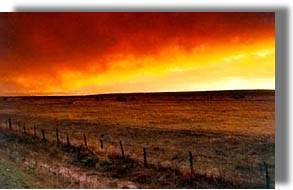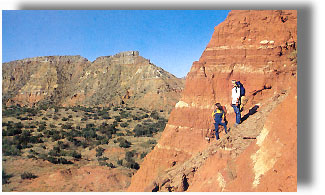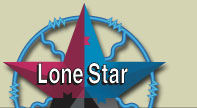
Sunset in Cayon taken by
Tycen Klemer |
General-
Canyon originated in1878 as a headquarters for
the huge T. Anchor Ranch. Canyon is the current seat of Randa County
and the gateway to the spectacular Palo
Duro Canyon State Park, also the
home of West Texas State A&M University.
Buffalo Lake National Wildlife Refuge-
One of the major waterfowl refuges on
the Central Flyway, the 7,677-acre refuge is a winter haven for
a million ducks and 80,000 geese. Once known as Tierra Blanca Water
Conservation Project, the lake now holds very little water but refuge
about 12 miles west continues to draw visitors on its interpretive
walking trail and 4,5-mile auto interpretive trail. Activities include
picnicking, sightseeing, birding, nature study, photography, and
campsites with tables, grills - no water or electricity. Open daily
8 a.m. - 10 p.m. Refuge headquarters 3 miles south of Umbarger
on FM, i68.
 Palo Duro Canyon State Park- Palo Duro Canyon State Park-
One of the state's largest state parks,
15,103 acres amid scenic landscape of Palo Duro Canyon, On the tabletop
expanse of the Texas High Plains, a branch of the Red River has
carved tile incredible spires and pinnacles of Palo Duro. Walls
plunge a thousand feet to the canyon floor, exposing brilliant multicolored
strata. Camping, picnicking, rest rooms and showers, horseback riding,
hiking trails, Sad Monkey miniature train ride, souvenir
& snack shop, interpretive center, and amphitheaters where shows
are staged during the summer season. About 12 miles east via Texas
217 and Park Road 5. Admission,
Within this park is a historical marker citing
the last great Indian battle in Texas. While on a sweep across the High Plains in 1874, the famous
Colonel Ranald S. Mackenzie, leading troops of 4th Cavalry from
Fort Richardson (see Jacksboro) discovered a huge camp
of Comanche Indians in the canyon. The Indians had escaped from
their prison-like reservations and were "menacing" a wide
area in Canyon. Colonoel Mackenzie had the advantage of achieving
surprise. His troops quickly overran the village and captured some
1,400 horses. The Indians fled to strong points in the wild canyon.
In a "master" stroke of tactics, Mackenzie did not try
to dislodge the Indians, but instead, he burned the village and
slaughtered their horses. Without shelter, provisions or the vital
mobility of their horses, the proud plains warriors had no choice
but to plod back to their reservations in Oklahoma and spend the
rest of their days in captivity.
Panhandle Plains Historical Museum-
On campus of West Texas State A&M
University; honors pioneers of Texas' colorful past. Built in 1933,
the structure is finished in Texas limestone and features on its
facade decorative stoneoi k and carvings. The building bears a State
Antiquities Landmark designation awarded for its unique Art Deco
architectural style. Entrance doors ornamented with historic brands;
fascinating Old West exhibits include chuck wagon, extensive gun
collection, prehistoric fossils and wildlife. Other collections
show prehistoric Indian cultures, archaeology and Frank Reaugh Collection
of Southwestern Art. it's really five museums in one with sections
dedicated to petroleum, Western heritage, paleontology, transportation,
and art.
A Research Center is open to researchers and
contains historic records and photographs documenting the history
of the Texas Panhandle and Southwest region.
A museum store offers a wide variety of gift
items, including authentic Indian jewelry, cookbooks, rock specimens,
posters, and much more.
Don Harrington Petroleum Wing incorporates latest
in exhibit design and museum interpretation. Geology, underground
tool and oil field displays give viewer feeling of "being there,"
Open Mon. - Sat. 9 a.m. - 5 p.m. (6 p.m. June
- Aug.), Sun, and holidays (except Thanksgiving, Christmas and the
day before, and New Year's Day) I - 6 p.m.
Pioneer Amphitheatre-
This outdoor stage is the setting for
"TEXAS," the spectacular outdoor
drama by Paul Green, presented nightly
except Sundays from late June through late August. Located in Palo
Duro Canyon State Park, and back dropped by a 600-foot cliff. Cowboys,
Indians, and settlers move over huge stage; riders spotlighted on
cliff side trails, stereo music echoes through the canyon, and a
finale that you will remember for a long time! Nationally acclaimed!
Show begins at 8:30 P.M. CDT. Barbecue dinner (fee) served nightly
before show. Separate admission for the park and show, but free
park admission after 5:30 p.m. for those attending show. All seats
reserved; advance reservations advisable. Canyon nights are cool
even in midsummer, (a warm blanket and/or jacket is recommended).
Tickets are available at theatre, also at "TEXAS" Information
Office, 2010 4th Avenue (Texas 217) in Canyon. (806)655-2181.
|


